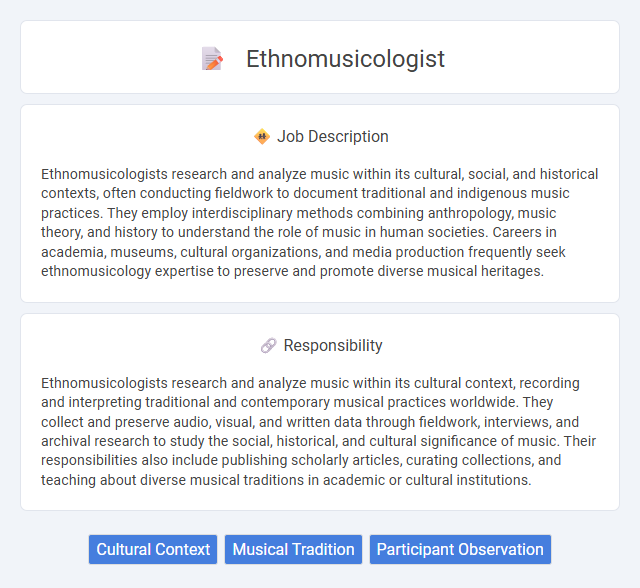
Ethnomusicologists research and analyze music within its cultural, social, and historical contexts, often conducting fieldwork to document traditional and indigenous music practices. They employ interdisciplinary methods combining anthropology, music theory, and history to understand the role of music in human societies. Careers in academia, museums, cultural organizations, and media production frequently seek ethnomusicology expertise to preserve and promote diverse musical heritages.
People who are curious about diverse cultures and have strong analytical skills are likely suitable for a career as an ethnomusicologist. Those comfortable with extensive fieldwork, including travel and immersive research, might find the job rewarding, while individuals seeking a conventional office environment may struggle. A passion for music and anthropology increases the probability of success in this field.
Qualification
Ethnomusicologists typically require an advanced degree, often a master's or PhD in ethnomusicology, musicology, anthropology, or related fields, emphasizing research and cultural studies. Proficiency in multiple musical traditions, fieldwork methodologies, and audio-visual documentation techniques is essential for thorough cultural analysis. Strong skills in data interpretation, language, and intercultural communication are critical for conducting effective ethnographic research and contributing to academic or cultural institutions.
Responsibility
Ethnomusicologists research and analyze music within its cultural context, recording and interpreting traditional and contemporary musical practices worldwide. They collect and preserve audio, visual, and written data through fieldwork, interviews, and archival research to study the social, historical, and cultural significance of music. Their responsibilities also include publishing scholarly articles, curating collections, and teaching about diverse musical traditions in academic or cultural institutions.
Benefit
Ethnomusicologists are likely to gain a deep understanding of diverse musical traditions, enhancing cultural appreciation and preservation. They probably benefit from opportunities to conduct field research in various communities, enriching their academic and experiential knowledge. This role may also offer the chance to contribute to interdisciplinary studies, potentially influencing education, anthropology, and musicology.
Challenge
Ethnomusicologists likely face challenges in accurately interpreting diverse musical traditions while respecting cultural contexts. They may encounter difficulties in accessing remote communities and overcoming language barriers during field research. The complexity of analyzing and documenting intangible cultural expressions often requires adaptability and interdisciplinary knowledge.
Career Advancement
Ethnomusicologists advance their careers by gaining expertise through field research, publishing scholarly articles, and securing academic positions at universities or research institutions. Specializing in specific cultures or musical traditions enhances opportunities for grants, fellowships, and speaking engagements at international conferences. Developing interdisciplinary skills in anthropology, music theory, and digital archiving further positions ethnomusicologists for leadership roles in cultural preservation and museum curation.
Key Terms
Cultural Context
Ethnomusicologists analyze music within its cultural context to understand its social, historical, and ritualistic significance across diverse communities. They conduct fieldwork involving participant observation, interviews, and audio recordings to preserve traditional music and uncover its role in identity, communication, and cultural expression. Their research supports cultural preservation, informs educational programs, and aids in recognizing music as a vital component of intangible cultural heritage.
Musical Tradition
Ethnomusicologists study musical traditions to understand the cultural, social, and historical contexts of diverse music forms. They analyze how music functions within communities, often documenting and preserving indigenous and folk music practices. Their work supports the interpretation of music as an essential expression of cultural identity and heritage.
Participant Observation
Ethnomusicologists conduct participant observation by immersing themselves in the musical cultures they study, engaging directly with performers and communities to gather authentic data on musical practices and social contexts. This fieldwork method allows for in-depth understanding of the cultural significance, performance techniques, and transmission of music within specific groups. Participant observation enriches ethnomusicological research by capturing nuanced behaviors and interactions that are often absent from recordings and interviews.
 kuljobs.com
kuljobs.com